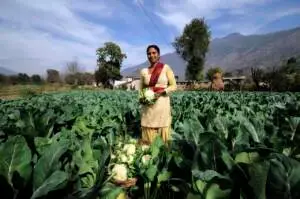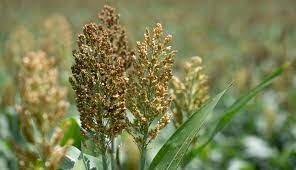No products in the cart.

Organic Farming in Agriculture: Embracing Sustainability and Health
Organic Farming in Agriculture: Embracing Sustainability and Health
Introduction
In recent years, organic farming has gained significant traction as consumers and farmers alike seek sustainable and healthy alternatives to conventional agricultural practices. But what exactly is organic farming in agriculture, and why does it matter? In this article, we’ll explore the principles, benefits, challenges, and future prospects of organic farming in agriculture. By the end, you’ll have a clear understanding of how organic farming is not just a trend, but a crucial step towards a more sustainable and healthier future.

Table of Contents
| Sr# | Headings |
|---|---|
| 1. | What is organic farming in agriculture? |
| 2. | Principles of organic farming in agriculture |
| 3. | Benefits of organic farming in agriculture |
| 4. | Challenges Faced by Organic Farmers |
| 5. | Organic Certification: What Does It Mean? |
| 6. | Organic vs. Conventional Farming |
| 7. | Environmental Impact of organic farming in agriculture |
| 8. | Economic Viability of organic farming in agriculture |
| 9. | organic farming in agriculture Techniques |
| 10. | Consumer Demand for Organic Produce |
| 11. | The Future of organic farming in agriculture |
| 12. | Conclusion |
| 13. | FAQs |
What is Organic Farming?
Organic farming refers to a method of agriculture that avoids synthetic chemicals and genetically modified organisms (GMOs) to produce crops and raise livestock. Instead, it relies on natural substances and biological processes.
Principles of Organic Farming
Organic farming is based on several principles:
- Crop Rotation: Growing different crops in succession to improve soil fertility and control pests.
- Compost and Green Manure: Using organic matter to enrich the soil naturally.
- Biological Pest Control: Using beneficial insects or other organisms to control pests.
- Avoidance of Synthetic Chemicals: Eliminating synthetic pesticides and fertilizers.
- Animal Welfare: Providing animals with organic feed and natural living conditions.
Benefits of Organic Farming
Organic farming offers numerous benefits:
- Environmental Sustainability: Preserves soil quality, reduces pollution, and conserves water.
- Health Benefits: Provides chemical-free produce and reduces exposure to harmful substances.
- Biodiversity: Supports diverse ecosystems and wildlife.
- Flavor and Nutrition: Produces food with better taste and higher nutritional value.
Challenges Faced by Organic Farmers
Organic farmers encounter challenges such as:
- Higher Costs: Organic methods can be more expensive.
- Lower Yields: Sometimes organic farms produce lower yields per acre.
- Certification Requirements: Meeting rigorous standards for organic certification.
- Market Access: Finding reliable markets for organic products.
Organic Certification: What Does It Mean?
Organic certification ensures that products meet strict standards set by regulatory authorities. It guarantees that food was produced without synthetic chemicals or GMOs.
Organic vs. Conventional Farming
Organic farming differs from conventional farming in these ways:
- Inputs: Organic uses natural fertilizers; conventional uses synthetic chemicals.
- Pest Control: Organic uses natural predators; conventional uses pesticides.
- Soil Health: Organic focuses on soil health and biodiversity; conventional may degrade soil quality.
Environmental Impact of Organic Farming
Organic farming has a positive environmental impact by:
- Reducing Soil Erosion: Enhancing soil structure and stability.
- Preserving Water Quality: Minimizing leaching of harmful chemicals.
- Mitigating Climate Change: Sequestering carbon in the soil.
Economic Viability of Organic Farming
Organic farming can be economically viable due to:
- Growing Market Demand: Increasing consumer interest in organic products.
- Premium Pricing: Organic products often fetch higher prices.
- Government Support: Some governments provide subsidies and incentives for organic farming.
Organic Farming Techniques
Organic farming employs various techniques like:
- Cover Cropping: Planting cover crops to manage soil erosion and fertility.
- Crop Diversity: Rotating crops to improve soil health and reduce pests.
- Natural Pest Control: Using biological methods to manage pests without chemicals.
Consumer Demand for Organic Produce
Consumer demand for organic produce is rising because:
- Health Awareness: Concerns about chemical residues and food safety.
- Environmental Concerns: Support for sustainable farming practices.
- Taste and Quality: Preference for fresher, tastier, and more nutritious food.
The Future of Organic Farming
Organic farming holds promise for:
- Expanding Global Reach: Growing interest in organic methods worldwide.
- Innovation and Technology: Advancing organic farming techniques.
- Policy and Regulation: Strengthening standards and supporting organic agriculture.
Conclusion
In conclusion, organic farming is not just a method of growing food; it’s a commitment to sustainability, health, and environmental stewardship. As we move forward, embracing organic farming practices can lead to a healthier planet and healthier people.
FAQs
- What are the benefits of organic farming? Organic farming offers environmental sustainability, health benefits, biodiversity support, and improved flavor and nutrition.
- Is organic farming more expensive? Yes, organic farming can be more costly due to higher labor and production costs.
- How can I tell if a product is organic? Look for the USDA Organic seal or other accredited organic certification labels on the packaging.
- Does organic farming use pesticides? Organic farming uses natural pesticides derived from plants and other natural sources.
- Can organic farming feed the world? While it faces challenges, organic farming has the potential to contribute significantly to global food production.
By embracing organic farming, we can secure a sustainable and healthier future for generations to come. Organic is not just a label; it’s a commitment to the planet and our well-being.
Go and turn on towards organic farming to save future and thire save childs:
Elevate Plant Growth with Premium Bone Powder – Buy Now!
Organic Cow Dung Compost: Transform Your Garden Naturally
Premium Humic Acid for Healthy Plants | Enhance Soil & Boost Growth
Boost Plant Growth Naturally with Mustard Cake | Organic Fertilizer
Transform Your Garden with NPK Fertilizer | Boost Growth by 30%
Premium Perlite for Enhanced Gardening | Buy Now
Live Earthworms with Enhance Your Garden (soil health)
1 Neem Khali: Unveiling the Wonders of Nature
1Transform your garden with vermiwash-buy now
1 Premium quality Vermicompost [ केचुआ खाद ]
Follow us:
Tagged Inorganic farming in agriculture


